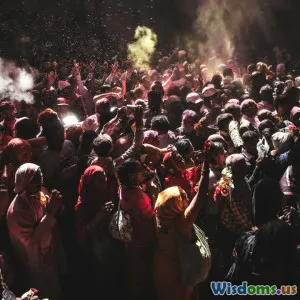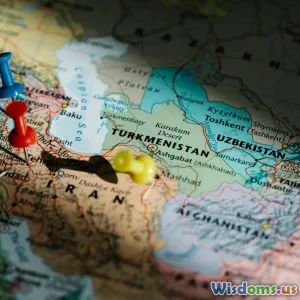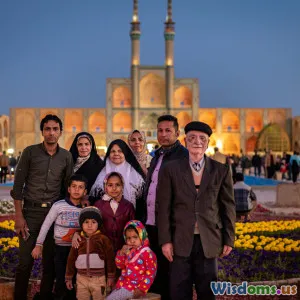
Cultural Festivals: Celebrating Diversity
9 min read Explore the vibrant tapestry of cultural festivals that celebrate global diversity and foster unity through shared traditions. (0 Reviews)
Cultural Festivals: Celebrating Diversity
Introduction
In a world that often seems divided, cultural festivals emerge as vibrant threads in the tapestry of humanity, weaving together diverse traditions, languages, and practices. These festivals are not just celebrations; they are profound expressions of identity, heritage, and community spirit. From the kaleidoscopic colors of Holi in India to the rhythmic beats of Carnival in Brazil, cultural festivals offer a unique lens through which we can appreciate the rich diversity of human experience. This article delves into the significance of cultural festivals, their role in fostering unity amidst diversity, and some iconic examples from around the globe.
The Role of Cultural Festivals in Society
Cultural festivals serve multiple purposes within society, acting as a bridge between the past and the present, and promoting inclusivity and understanding among different communities.
Preserving Heritage and Traditions
One of the primary functions of cultural festivals is the preservation of heritage. For instance, the Midsummer Festival in Sweden is not merely a celebration of the summer solstice but a way to uphold centuries-old customs, including traditional dances, songs, and the crafting of flower crowns. Such festivals ensure that younger generations remain connected to their roots, fostering a sense of identity and belonging.
Fostering Community Spirit
Cultural festivals also play a pivotal role in strengthening community bonds. The Oktoberfest in Munich, Germany, not only draws millions of visitors but also unites locals and tourists in a shared experience of food, music, and merriment. This sense of community is essential in an increasingly globalized world, where individuals often feel isolated despite being surrounded by people.
Promoting Understanding and Tolerance
In today’s multicultural societies, cultural festivals are vital for promoting understanding and tolerance among diverse groups. For example, the Edinburgh Festival Fringe, the world’s largest arts festival, showcases performances from various cultures, allowing people to engage with different perspectives and narratives. Such interactions break down stereotypes and foster mutual respect.
Iconic Cultural Festivals Around the World
While countless festivals celebrate diversity, a few stand out due to their scale, significance, and unique traditions.
1. Diwali – The Festival of Lights
Celebrated predominantly by Hindus, Diwali marks the triumph of light over darkness and good over evil. This festival, observed in India and by Indian communities worldwide, involves lighting oil lamps, decorating homes, and preparing festive meals. According to a 2022 report from the Indian Ministry of Culture, Diwali contributes significantly to the economy, particularly in sectors like retail and hospitality, making it not just a cultural event but an economic powerhouse.
2. Carnival – A Celebration of Life in Brazil
Carnival in Brazil is a dazzling display of samba, colorful costumes, and street parades that attracts millions from around the globe. Rooted in Afro-Brazilian culture, the festival is a time for joy and celebration, but it also addresses social issues, with many samba schools using their performances to highlight themes of racial equality and social justice. The 2023 Carnival brought in an estimated $1 billion in tourism revenue, showcasing its impact on the local economy.
3. Chinese New Year – A Global Celebration
Chinese New Year, or Spring Festival, is celebrated by over 1.5 billion people around the world. The festival not only marks the beginning of the lunar new year but also serves as a time for family reunions and honoring ancestors. Cities like San Francisco and Sydney host elaborate parades featuring dragon dances and fireworks, illustrating how this festival transcends cultural boundaries and brings people together.
4. La Tomatina – A Unique Spanish Tradition
La Tomatina is a quirky festival held in Buñol, Spain, where participants engage in a massive tomato fight. While it may seem frivolous, it symbolizes the joy of community and the spirit of fun. The 2023 edition of La Tomatina attracted over 20,000 people, showcasing how unique traditions can draw international attention and boost local tourism.
5. Holi – The Festival of Colors
Holi, celebrated primarily in India, is known for its vibrant colors and joyous atmosphere. The festival signifies the arrival of spring and the victory of good over evil. Participants throw colored powders and water at each other, creating a festive and inclusive environment. Holi has gained international recognition, with celebrations occurring in countries like the United States and Canada, promoting cross-cultural understanding.
The Economic Impact of Cultural Festivals
Cultural festivals are not merely cultural phenomena; they also have significant economic implications. According to a study conducted by the World Tourism Organization, cultural tourism, including festivals, accounts for 40% of global tourism revenue. Festivals like the Coachella Valley Music and Arts Festival in California not only celebrate music and art but also generate millions in local economic activity, creating jobs and supporting local businesses.
Challenges Facing Cultural Festivals
Despite their importance, cultural festivals face challenges that threaten their sustainability and authenticity.
Commercialization
One major concern is the commercialization of cultural festivals. As these events grow in popularity, there is a risk that their original meanings and traditions may become diluted. For example, the once-traditional Running of the Bulls in Pamplona has faced criticism for being overly commercialized, with tourists sometimes prioritizing entertainment over cultural significance.
Environmental Impact
Furthermore, the environmental impact of large festivals cannot be overlooked. Events like Glastonbury Festival in the UK have been criticized for their carbon footprints. Organizers are now increasingly focusing on sustainability, implementing measures to minimize waste and promote eco-friendly practices.
Conclusion
Cultural festivals are vital expressions of human creativity, resilience, and diversity. They offer a platform for communities to celebrate their heritage while fostering understanding and tolerance among different cultures. As we navigate an increasingly interconnected world, the significance of these festivals cannot be overstated. By participating in or supporting cultural festivals, we not only honor our own traditions but also embrace the rich tapestry of human experience that unites us all. In celebrating diversity, we pave the way for a more inclusive and harmonious future.
Let us not just observe these festivals from afar but actively engage with them, learning from the stories they tell and the traditions they uphold. After all, in the vibrant kaleidoscope of cultural festivals, we find not just celebration but a deep sense of shared humanity.
Rate the Post
User Reviews
Popular Posts





















